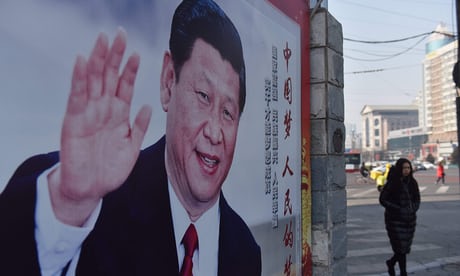
Feb 28, 2018
It is the 14th letter in the English alphabet and, in Scrabble, the springboard for more than 600 8-letter words.
But for the Communist party of China it is also subversive and intolerable character that was this week banished from the internet as Chinese censors battled to silence criticism of Xi Jinping’s bid to set himself up as ruler for life.e
The contravening consonant was perhaps the most unusual victim of a crackdown targeting words, phrases and even solitary letters censors feared might be used to attack Beijing’s controversial decision to abolish constitutional term limits for China’s president.
The Communist party has painted the move – which experts say paves the way for Xi to become a dictator for life – as an expression of overwhelming popular support for China’s strongman leader. However, there has been widespread online push-back in China since it was announced on Sunday on the eve of an annual political congress in Beijing.
In a blog post, Victor Mair, a University of Pennsylvania China expert, said censors had taken “quick, drastic action” after “the internet was flooded with complaints”.
According to a list compiled by the China Digital Times website, search terms blocked on Weibo, China’s Twitter, included:
– ‘Ten thousand years’ (万岁), which is China’s way of saying: ‘Long live!’ or ‘Viva!’
– ‘Disagree’ (不同意)
– ‘Xi Zedong’ (习泽东) – a hybrid of the names of Xi and Chairman Mao Zedong
– ‘Shameless’ (不要脸)
– ‘Lifelong’ (终身)
Advertisement
-‘Personality cult’ (个人崇拜)
-‘Emigrate (移民)
– ‘Immortality’ (长生不老)
The name Yuan Shikai, a Qing dynasty warlord who unsuccessfully tried to restore monarch to China, was also banned as were the titles of two George Orwell books, 1984 and Animal Farm.
Less clear is why censors took issue with the letter ‘N’. Mair speculated it was “probably out of fear on the part of the government that ‘N’ = ‘n terms in office’, where possibly n > 2”.
Charlie Smith, the alias of the founder of GreatFire.org, a group which helps users track and bypass Chinese censorship, said he found that explanation plausible.
“[Censors] probably determined it was sensitive and then moved to add that content to the blacklist so others would not be able to post something similar,” he said, noting that the seditious symbol had now been emancipated.
“I doubt that they actually put that much thought into it so sadly, the letter ‘N’ was a temporary victim of this rash decision.”
On Wednesday, Beijing accused the west of reacting “hysterically” to the scrapping of presidential term limits.
“No sooner had [the party] made public its proposal … than the Western media began bad-mouthing China in their usual and various ways,” the party-run Global Times tabloid said in an editorial.
“It is worth noting that for some time the Western media have been growing strident in their abuse of Beijing, almost using curse words,” the newspaper added, claiming those behind the criticism hoped to see “China crumble”.
Smith said he believed Beijing had underestimated the outrage its decision would cause. “The response from Chinese netizens indicates that Xi may have miscalculated how this would be received by the general public. Hence, he has asked the censors to put in overtime and things like the letter ‘N’ end up as collateral damage.”
For now, censors might feel they had the situation under control. “But if the momentum continues to build and netizens continue to look for other ways to express their displeasure with Xi, we could reach a critical point where the authorities might have to consider ‘turning off’ the internet, however they might do that,” Smith added.
“Now, more than any other time in recent history, those who are in a position to help Chinese netizens freely express their opinions and freely access information should step up and lend a hand.”










